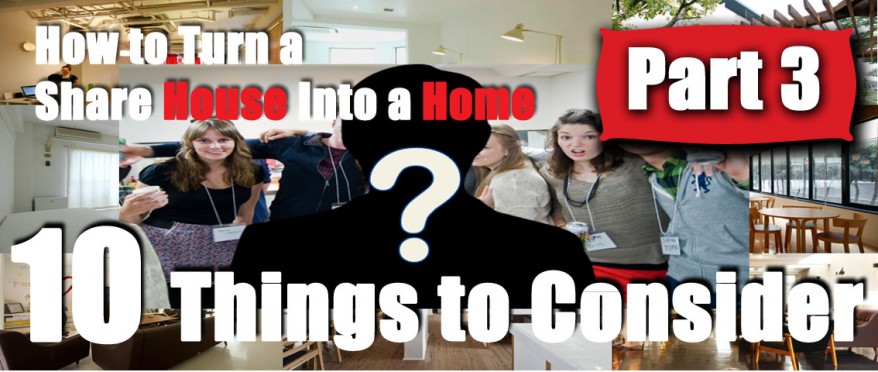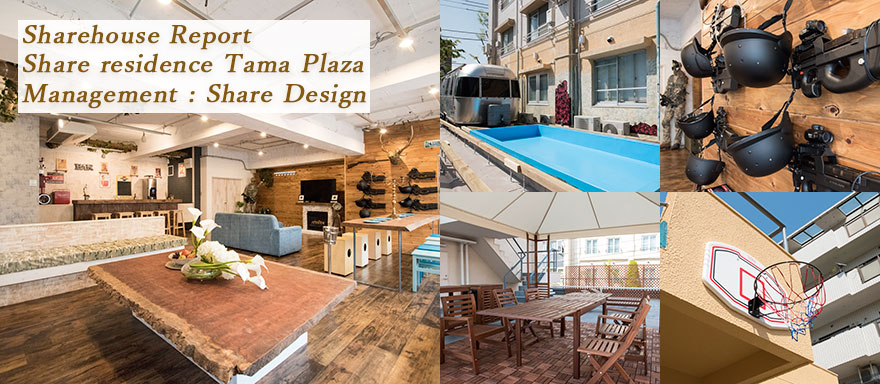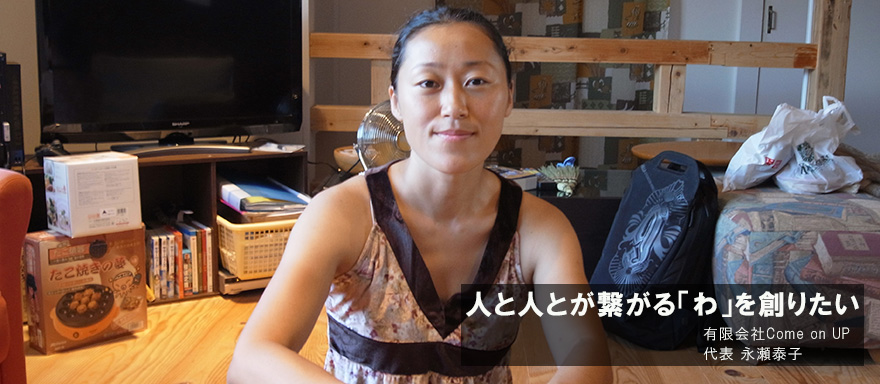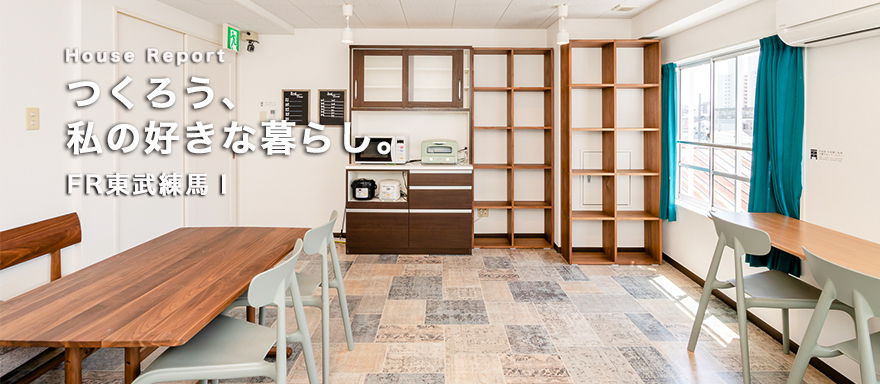6. Assessing the manager
You’ve taken a look around the house, and so far everything seems to be going according to plan. However, there’s one thing that some people may forget when looking into a share house. With a big company that moves people into apartments, once you’ve signed the contract and moved in, that’s it.  You’re living on your own and you probably won’t have to deal with the company again until your contract expires or you decide to move. Share houses are a bit different. Because there are several people, sometimes a lot of people living together in these houses, situations that require a manager to step in are a lot more likely than a person living alone in an apartment. There’s also the possibility of conflict between residents, forcing someone to step in to keep things civil. To make sure everything runs smoothly, share house managers drop by the share houses anywhere from once a month to several times a week. Making sure you’ll be on good terms with the manager is another important point in moving into a share house.
You’re living on your own and you probably won’t have to deal with the company again until your contract expires or you decide to move. Share houses are a bit different. Because there are several people, sometimes a lot of people living together in these houses, situations that require a manager to step in are a lot more likely than a person living alone in an apartment. There’s also the possibility of conflict between residents, forcing someone to step in to keep things civil. To make sure everything runs smoothly, share house managers drop by the share houses anywhere from once a month to several times a week. Making sure you’ll be on good terms with the manager is another important point in moving into a share house.
When visiting the share house to have them show you around, this is a good opportunity to start a bit of conversation and maybe get to know a little bit about them. This is also a great opportunity to get a bit more info regarding the share house and its residents. How many foreigners are in the share house? Do they know if residents are frequently in the lounge? Has there been any trouble with residents in the house lately? How often can you expect to see the manager at the share house? Nobody will know the house better than the manager, so you should really rack your brain and think of as many questions as possible about the house as well as the surrounding area.
The manager can also be your friend, and you’ll be thankful to have good relations with them when you’re in a bind.
7. Making a good first impression
 So you’ve bit the bullet. You’ve given the manager the OK, and you’ve decided to move in! Are you excited? Nervous? Whatever you’re feeling, it’s natural, so don’t worry about it. Compared to moving into an apartment alone, moving into a share house is a completely different experience. For example, regardless of whether there are any other new residents or not, every share house has a flow to it, like a river. Everyone there (if they’re not new) knows who they get along with, and what you should or shouldn’t do in the house. It’s almost like you’re a student starting fresh at a new school. You’ll have to find your place to fit in with the flow of the share house, and to do that, you’ll want to put your best foot forward when you move in.
So you’ve bit the bullet. You’ve given the manager the OK, and you’ve decided to move in! Are you excited? Nervous? Whatever you’re feeling, it’s natural, so don’t worry about it. Compared to moving into an apartment alone, moving into a share house is a completely different experience. For example, regardless of whether there are any other new residents or not, every share house has a flow to it, like a river. Everyone there (if they’re not new) knows who they get along with, and what you should or shouldn’t do in the house. It’s almost like you’re a student starting fresh at a new school. You’ll have to find your place to fit in with the flow of the share house, and to do that, you’ll want to put your best foot forward when you move in.
Because this is Japan, it never hurts to abide by some of the customs here as a foreigner. If you were buying a house and moving into a new neighborhood, it’s often considered a nice gesture to give an ‘omiyage’, or souvenir, to your neighbors. This is typically something simple and useful for the house, but for a share house, a simple box of sweets is usually a good way to go. For those of you entering a predominantly Japanese share house and find yourself at a loss for what to say, have no fear! This article is here to help see you through. When you’re first moving in and taking out your ‘omiyage’, you can try saying the following:
つまらないものですけど、よかったらみんなで食べてください。
While simple, it’s a fairly common phrase when offering these types of presents, and your new share mates are sure to be impressed that you went through the trouble of bringing a gift.
8. Interaction with the residents
 Even if you’re not all that sociable, now’s the time to act and try to get to know people. Since you’re new to the share house, people are sure to take an interest in you, so don’t be surprised if people ask you a lot of questions. On the flipside, you may be the one who wants to be asking the questions. Where they’re from, what their hobbies are, be sure to ask anything that crosses your mind. If you’re unfamiliar with the area, you could even ask if someone could show you around. This will give you some quality time to talk with your new share mates while also getting to know the area.
Even if you’re not all that sociable, now’s the time to act and try to get to know people. Since you’re new to the share house, people are sure to take an interest in you, so don’t be surprised if people ask you a lot of questions. On the flipside, you may be the one who wants to be asking the questions. Where they’re from, what their hobbies are, be sure to ask anything that crosses your mind. If you’re unfamiliar with the area, you could even ask if someone could show you around. This will give you some quality time to talk with your new share mates while also getting to know the area.
If you’re looking to meet as many people in the share house as possible, hanging around in the lounge is definitely a good way to go about it. As you find people to strike up conversation with, you’ll find others passing through on their way out, heading to the kitchen to cook a meal, or they might just be taking a break in the lounge as well. Having said that, there may be some people who simply aren’t interested in socializing or don’t visit the lounge at all, so don’t feel discouraged if you don’t get to meet everyone right away. Before you know it, you’ll feel like you’re a part of a family.
9. Events
 Share houses are generally designed to promote socializing and interacting with other residents. While not every share house does, events are another great ice breaker to meet other residents, and to just have a great time. Whether it’s a barbecue planned by the manager, or a spur of the moment pizza party started by your share mates, if the house is known for hosting parties and events there’s no telling what to expect.
Share houses are generally designed to promote socializing and interacting with other residents. While not every share house does, events are another great ice breaker to meet other residents, and to just have a great time. Whether it’s a barbecue planned by the manager, or a spur of the moment pizza party started by your share mates, if the house is known for hosting parties and events there’s no telling what to expect.
However, some share houses host events with a particular theme. For example, Connect House is known for its business lectures, presentations from professionals, and various opportunities to start business in the cooking industry. On the other hand, you have share houses like Cocoya that host international parties on a larger scale not just for share house residents, but for the public in general. These types of events not only give you a chance to know your share mates better, but also to meet people you probably would never see otherwise.
Compared to living by yourself in apartment, the possibilities for a good time are endless. Even if it’s not initiated by the house management, don’t be surprised to find yourself having a great time when people get caught up in the moment.
10. Is a share house right for you?
If you’ve come this far, then hopefully this article helped give you a better understanding of share houses and what to expect when moving into one. Whether you’re taking a long vacation, studying abroad, or currently working in Japan, they can be quite accommodating with locations in more places than you can imagine. Their low prices also make it very easy to move in for a long haul, or just long enough to get on your feet. The only thing left to ask yourself, is if a share house is right for you.
Because share houses in Japan pride themselves on offering pleasing accommodations and a great social experience, you’ll find share houses of all shapes and sizes, with different themes, unique facilities, and even very gracious discounts. At the end of the day, however, this is a share house, and you have to be prepared with living with others. Having lived in an apartment with roommates, and living in a share house now myself, I can say that it’s a very unique experience in comparison to apartment life. When I choose to stay in my room, it feels like I’m in a plain Japanese apartment, but as soon as I go downstairs it’s completely different, and not always the same every day. There are some days where it’s very quiet, and it’s a great place to lay out my books and work with extra space in comparison to my room. Other days it feels like I went to go hang out with friends somewhere; lots of people laughing together, watching TV, and cooking, like one big family.
If there are mainly Japanese people in the share house, another very important thing to consider is the language barrier. For those interested in Japanese language and culture, I highly recommend trying a share house if only for the ample opportunities you’ll have to try your Japanese. At the same time, for some people it’s possible to have too much of a good thing. Without your native language to fall back on, you may find yourself frustrated in trying to convey your thoughts to others, or you may simply get burned out or overloaded on Japanese. If you’re concerned you may fall into this category of people, before giving up on share houses, I would at least recommend looking for a share house that boasts a more international experience, with an even amount of foreigners and Japanese residents as one of its selling points.
All in all, the Japanese share house experience is one you won’t regret. Whatever your intentions are for moving in, you’ll walk away with a lot more than you were expecting, I assure you. With great locations, affordable prices, and the chance to make new friends while fine tuning your Japanese skills, what do you have to lose?
/Author: Paul






